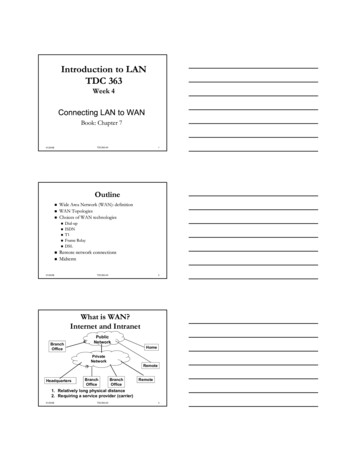
Transcription
UDDHAVA GĪTĀŚrīmad BhāgavatamCanto 11 chapter 6-29Śrī Kṛṣṇa Dvaipāyana VyāsadevaTranslation: Anand Aadharthird revised edition updated 2018
2With gratitude towards the Vaishnava spiritual teachers and devotees:ŚrīlaViśvanātha Cakravartī Ṭhākura,Śrīla Bhaktisiddhanta Sarasvatī Ṭhākura,His Divine Grace A.C. Bhaktivedānta Swami Prabhupāda,Bhanu Swāmī Mahārāj,Hridyānanda dāsa Goswami,Gopīparānaṇdhana dāsa Adhikāri,Bhumipati dāsa,C.L. Goswami M.A. Sāstri,Śrī Hayeśvara dāsa,andSakhya Devī dāsī who always corrected everything.Copyright: 2018 Anand Aadhar.For this translation the copyright applies of theCreative Commons Attribution-Noncommercial-Share Alike 3.0 Unported License.This means that one is free to copy and change the text under the condition that1) the name of Anand Aadhar is mentioned with a link to the site bhagavata.org,2) the text is not used for any commercial purpose and that3) the resulting work can only be distributed under the same or a likewise license.
3CONTENTS- Introductionp. 41 Retirement on the Advise of Brahmā and Uddhava Addressed in Privatep. 82 Kṛṣṇa Speaks about the Masters of the Avadhūta and the Pigeonof Attachmentp. 143 What One Learns from Nature and the Story of Pingalāp. 224 Detachment from All that is Materialp. 275 The Soul Free, the Soul Boundp. 326 Bondage and Liberation Explained and the Devotional Serviceof the Saintly Personp. 377 The Confidential Secret Beyond Renunciation and Knowledgep. 438 The Hamsa-avatāra Answers the Questions of the Sons of Brahmāp. 469 The Devotional Coherence of the Methods and the Meditation on Viṣṇup. 5210 Mystical Perfection: the Siddhisp. 5811 The Lord's Opulencep. 6312 The Varnāśrama System and the Boat of Bhakti:the Students and the Householdersp. 6713 The Varnāśrama System: the Withdrawn and the Renouncedp. 7514 The Perfection of Spiritual Knowledgep. 8115 Trikānda Yoga: Bhakti Surpasses Knowledge and Detachmentp. 8716 On Distinguishing between Good and Badp. 9117 Prakṛti and Puruṣa: Nature and the Enjoyerp. 9818 Forbearance: the Song of the Avantī Brāhmanap. 10619 Analytic Knowledge, Sāṃkhya, Summarizedp. 11320 The Three Modes of Nature and Beyondp. 11721 The Song of Purūravāp. 12122 On Respecting the Form of the Lordp. 12423 Jñāna Yoga or the Denomination and the Realp. 13124 Bhakti Yoga: the Most Auspicious way to Conquer Deathp. 138- Glossaryp. 144
4IntroductionLord Kṛṣṇa, a Vedic prince who lived about five thousand yearsago, is predominantly known as the speaker of the Bhagavad Gītā, thetalk He delivered to his doubting friend Arjuna just before the greatbattle of the Mahābhārata began. With that war the Vedic age of thegreat kings [Dvāpara-yuga] ended and the present age of quarrel[Kali-yuga] commenced. Ever since there was no natural relationshipanymore between the sages and the rulers, for reason of which theworld more or less has fallen into chaos. But there is also a secondtalk of Kṛṣṇa in which He extensively reports about His science andnature. The second time He spoke His mind to His nephew, greatfriend and devotee Uddhava, just before Kṛṣṇa left the earth. ThisGītā, part of the masterly frame story the Bhāgavata Purāna - the socalled Śrīmad Bhāgavatam - is of a different tone. While He in theBhagavad Gītā admonishes Arjuna to fight and perform his duty as awarrior, Kṛṣṇa in this talk advises Uddhava on how to serve Him withdevotion and find liberation when He Himself is no longer physicallypresent on earth.The story has a more personal ring, is more narrative withexamples and dilates a bit more, even though sometimes the same orlikewise verses are encountered. The story is therefore easier to readand less abstract. He first of all explains to Uddhava that he has togive up his attachments in order to find liberation in His service.Without that spiritual connectedness one is a lost, eternally bound soulcondemned to return again to the material world full of misery. Heteaches Uddhava to recognize Him in all and everything like a threadrunning through a pearl necklace, as He told Arjuna. Uddhava thenstates, just like Arjuna again, that he finds yoga a difficult to performdiscipline and asks for further instruction. Kṛṣṇa answers that only byone's intelligence deriving from indirect symptoms one cannot attainHim, one needs to be devoted in going for the direct symptoms of Hisdifferent appearances. He proceeds to give a description of a sage
5explaining about all the teachers he had. There is not one guru orsource of knowledge in one's life. One learns from the earth, the air,the sea, the moth, the honey bee and many other teachers one meets.Kṛṣṇa mentions twenty-four of them in a few chapters and explainsthat knowledge acquired from a single teacher cannot be very solid orcomplete. The Absolute Truth of the complete whole is by the sagessung in many ways. Next He elaborates further on the details of Hisscience. What would be health and what is liberation? What is themeaning of religious rituals and how must one meditate? What doesperfection entail and what are His opulences? On the basis of whatsocietal order can one be of service unto Him and what is all meant bythe perfection of spiritual knowledge? Are there different forms ofyoga and what would be the best one? What to say about thedifference between good and evil? And how about the relationbetween the person and material nature?Uddhava asks Kṛṣṇa how to remain calm when one is approachedwith negativity by others. Kṛṣṇa then relates the story of a brahminendeavoring too frantically for material purposes and too little inrespect of people. Material existence, however much one tries one'sbest for it, time and again results in frustrations. True happinesscannot be found that way. And thus one arrives at detachment,however lusty and prosperous one's life has been. One looks forlasting happiness after all. For that purpose one's mind must besubjected to the proper discipline of meditation. With a correct insightin matters of cause and effect one may find liberation and lastinghappiness, meanwhile learning to overcome negative consequences,karmic reactions. There is no other cause of happiness and distressthan the material bewilderment of one's mind. Because of thatbewilderment one sees a world filled with friends and foes. One thensees Him not everywhere any longer and has lost one's way. Thereforedo not judge too rashly and try to rise above the world of opposites. Intranscendence one finds liberation.Kṛṣṇa next expounds on the nature of material reality and thedegree to which we are all determined by it. Everything around us, the
6complete of our material existence is a product of the interaction ofthe natural modes or qualities and functions, and the time. One has toacknowledge that there is a fourth state of consciousness next to theones of sleeping, waking and dreamlessly being absent, an extradimension in which one must manage to find oneself. By meditationone attains that fourth state. It is all about the stabilization of thatconsciousness.Kṛṣṇa then relates another story. It is a story about an emperorturning into a complete fool the moment his wife abandons him. In hismisery he arrives at understanding. Attached to female beauty andsense gratification a man fails to meet his essence. One therefore hasto develop devotion unto Him so that a marriage does not become anunbearable burden and enjoyment is not a sin. Dedicate everything toHim, that is how one finds liberation.Kṛṣṇa then clarifies how one can worship His form. One organizesrituals with a material purpose and for that reason they are associatedwith karmic matters. But in bhakti, His devotional service, one has tolearn to live one's love free from ulterior motives, especially the lovefor His person and wisdom. An idol is not a purpose in itself, butrather constitutes a gateway for the purpose of realizing Him fromwithin. It is a necessary process of material actions, just as one withclocks and calendars culturally worships His impersonal nature oftime until one has retrieved His original Time, nature and naturalharmony. By karma one loses oneself, by dharma one saves oneself.Karma means to suffer profit-minded labor and selflessly that isovercome. Dharma is religion and nature, and by devotion andmeditation one regains that connectedness and original harmony.Kṛṣṇa finally offers an exposition about the interest of properlydiscriminating between mind and matter, between soul and body.What is actually real and what is just a denomination of that what isreal? It is the identification with matter that constitutes the hindrancebecause of which we are locked up in a false ego of 'I' and 'mine' thatwe take for real. Kṛṣṇa shows the way of liberation in the soul that is
7never alone, but is always together with Him as an eternal friend, liketwo birds sitting in a tree. One bird enjoys the fruits, the other one iswitnessing. Once being liberated one is not that much concerned anylonger about all external matters so that one, self-enlightened, iselevated above the world of opposites. Kṛṣṇa explains how one canconquer the different hindrances in one's life and how one may attainthat liberation. Appease the mind by repeating His names in silencewith prayer beads, thus let go of everything and finally attain Him.Even endeavoring for one's health one must ultimately give up inorder to reach His destination. Kṛṣṇa concludes with a discussion ofthe yoga of devotion, of bhakti, as the most suitable way to overcomeall hindrances. He thereto pleads for seeking association withdevotees, for congregational singing, for devotional service and forthe beneficial effect it has on one's character. With one's devotion oneshould recognize Him in each and everyone and thus overcome theburden of one's mortality.With love and devotion,Anand Aadhar, Enschede, 25 sept 2015.
8Chapter 1Retirement on the Advise of Brahmāand Uddhava Addressed in Private(1) Śrī Śuka said: 'Thereafter lord Brahmā arrived [in Dvārakā]being surrounded by his sons, the gods and the lords of man. LordBhava [Śiva] also came, the for all living beings favorable controller,who was accompanied by a host of ghostly beings. (2-4) Also Indrathe powerful controller and his gods [the Maruts] came, the sons ofAditi, the good ones of clarity [the Vasus], the protectors of health [theAśvins], the artists [the Ribhus], the descendants of Angirā, theexpansions of Śiva [the Rudras], the demigods of the intellect [theViśvedevas], of commerce [the Sādhyas] and other demigods, thesingers and dancing girls of heaven [Gandharvas and Apsaras], theones of excel [the Nāgas], the perfected ones [Siddhas] and thevenerable souls [Cāranas], the treasure keepers [Guhyakas], the seers[the Ṛṣis], the forefathers [Pitas] and the scientists [Vidyādharas] asalso the ones of special talents [the Kinnaras], all came together inDvārakā eager to see Kṛṣṇa, the Supreme Lord who removes theimpurities everywhere in the universe, who with His transcendentalform enchants the entire human society and spreads His famethroughout all the worlds. (5) In that splendid city rich with a greatabundance they with their hungry eyes saw Lord Kṛṣṇa who is sowonderful to behold.(6) Covering Him, the best of the Yadus, with flower garlandsbrought from the gardens of heaven, they praised Him, the Lord of theLiving Being, and expressed themselves in all kinds of amazing ideasand words. (7) The gods said: 'We with all our intelligence, senses,vital air, mind and words bow down at Your lotus feet, oh Lord, thefeet upon which they meditate in their heart who are connected in thelove of striving for liberation from the powerful grip of karmicconsequences. (8) You, by [engaging] the material energy consisting
9of the three modes, create, protect and destroy the inconceivablecosmic manifestation within Yourself while being situated withinthose modes. [Nevertheless] You are by them not entangled in karmicactivities at all, oh Unconquerable One, because You, theirreproachable Lord, are always absorbed in Your unrestrictedhappiness [see also B.G. 3: 22]. (9) Oh Worshipable One, thepurification of those persons who have a contaminated consciousnessis not as much brought about by incantations, respecting injunctions,study of the scriptures, charity, penances and rituals, oh Greatest ofAll, as it is caused by listening to those souls who are situated in puregoodness and have a fully matured and transcendental faith in Yourglories [see also 4.29: 36-38]. (10) May there for us be Your lotus feet,the fire that annihilates our inauspicious mentality and that by sagesdesiring the real benefit is carried in their appeased hearts, the fire ofYour four forms [of soul, ego, mind and intelligence, the catur-vyūha]that three times a day is worshiped by the self-controlled devotees soas to reach beyond the [material] heavens and acquire an opulence likeYours. (11) Upon them [Your feet] they are meditating, oh Lord, who,having folded their hands, pour the ghee they took into the fire ofsacrifice in the [nirukta] process of understanding the three Vedas.Upon them the yoga practitioners are meditating who, inquisitiveabout Your [yoga-]māyā mystic potency, are united in the realizationof the True Self. [But] they are fully attained [only] by the mostelevated devotees [see uttama and 11.2: 45-47]. (12) With thewithered flower garland that we offer You, Your Lordship's consort Śrī[dwelling there], oh Almighty One, feels challenged like a jealous cowife, for You accept this offering as being properly performed [seealso B.G. 9: 26]. May there always be Your lotus feet, the fire thatconsumes our impure desires! (13) Your feet that like flags decoratingflagpoles with three mighty steps [defeat the possessiveness and bringdown the water of the Ganges] in each of the three worlds [see 8.20],create fear among the armies of the demons and fearlessness amongthe troops of the God-fearing souls. For the virtuous souls they arethere for the attainment o
By meditation one attains that fourth state. It is all about the stabilization of that consciousness. Kṛṣṇa then relates another story. It is a story about an emperor turning into a complete fool the moment his wife abandons him. In his misery he arrives at understanding. Attached to female beauty and sense gratification a man fails to meet his essence. One therefore has to develop .











